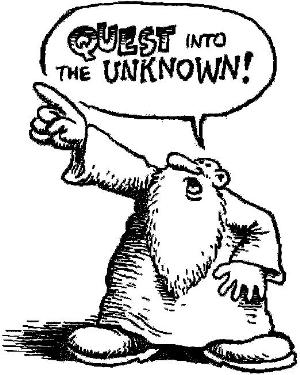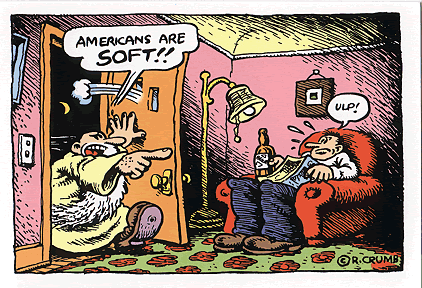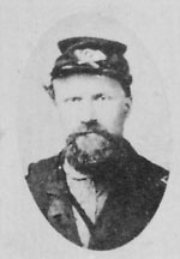The Game Outside of the Game
 •
by
•
by Pfenix Quinn
"Commies -> Communism -> Communes -> Communities -> Commons -> Common Sense"
-- Rainy Sunday, quoted in SFP News Feed, Day 732
"How do you make a player more active? You can’t order him to be more active. He will just resent it. You can’t threaten him, he will just quit playing. Call him a two clicker, fill his inbox with PM’s, send him tickets to move out of his home state, tell him he isn’t important unless he’s playing your version of the game, all will fail.
"You must offer him more. You must make him want to be more active. He must seek out the game outside of the game. You must reach out to him on a level that he starts to think about the game when he isn’t in front of the screen.
...
"To do this, you must get him to care. Get him to care about the country, his eFriends, his place in the eSociety. You must give him a place where he belongs, and more than that, a place where his actions and opinions matter. That is the social strategy aspect of the game. That’s why politics and newspapers and forums matter every bit as much as damage output."
-- Genghis Hank, A Barbarian at the Gate, Day 734

Greetings fellow e-earthlings! Back from a refreshing break that took me into the wild, through history and to the mountaintop, I am back here now and ready to continue, for your reading pleasure, this archeo-semantic dig into the recently-discovered "Prison Notebooks" of Phoenix Quinn.
I have two inter-related themes to share with you fine folks today. First, a few notes about Quinn's love of the eRep Press. And then another look at one of the many obscure real-life-U.S.A. historical personages whom he admire
😛General Johann August Ernst von Willich, commander of the 32nd Indiana and defender of Cincinnati.
WORDS, WORDS, WORDS
"Every man’s conscience is vile and depraved
You cannot depend on it to be your guide when it’s you who must keep it satisfied"
-- Bob Dylan, "The Man in the Long Black Coat", 1989
Paging through back-issues of the SFP News Feed that were pasted into the Notebooks, and looking at his many annotations to other folks' articles, it's certain that Quinn valued the eRepublikan Press above all else. As editor of the News Feed, he obviously enjoyed promoting entertaining or thought-provoking writing no matter what its political content.
For example, Genghis Hank, quoted above, was not a "giant" of the game. He only ever wrote 10 articles. The one quoted from above: "Thoughts on the Strategy of Being Social", was his last one. A recommended read from the SFP News Feed, a publication of the old SFP Org, the article appears to have been recommended not because Citizen Hank was a SFPer, but simply because it was a well-stated argument for using the words.
PQ's Prison Notebooks contain plenty of references to articles that PQ found to be in poor taste. But he seldom engaged in polemics, neither in the comments sections nor as direct responses in his own writing.
Leafing through all this material along with the PQ canon itself, it is striking
that, despite his combative reputation, Quinn seldom engaged in direct ad hominem criticisms. He seemed to prefer oblique critiques, almost in the form of parables, that only become identified with individual persons if and when they volunteered to identify themselves with one of his crazily over-the-top categories such as "lick-spittle-lackies of the Dealer", "zombified bureaucrat-grunts" or whatever.
Trying to decipher his "code" now, years later, I find it both amusing and interesting to see that there are clippings from Mr. Natural and Fabulous Furry Freak Brothers cartoons scattered throughout the Notebooks. These cartoons are often taped into the margins next to early drafts of PQ's articles, or provided as a kind of graphic commentary on an article that Quinn either liked or disliked.
Sometimes the reference is all-too obvious, like the following next to an interview with Vincent Nolan about communes:

Other times, and perhaps more interestingly, it seemed that his incessant references to obscure works, his shameless riffs on real-world works, and his earnest attempts at analysis were an effort to capture the zeitgeist of the weird, almost-but-not-quite rude, intensity of R. Crumb's style of criticism, but in words rather than drawings...


...to what end, I am still not sure anyone can say with certitude.
THE OHIO HEGELIANS
PQ's obscure or occulted references to hosts of philosophers, thinkers, writers, poets, revolutionaries, poets and musicians entertained and delighted some readers while it befuddled and annoyed others.
A few of his headier themes became all-too-familiar ones.
For example, dedicated fans no doubt fondly recall his fierce fulminations against "vulgar Hegelianism".
His later more mathematically inclined expositions on "the lacuna in the dialectic", "the search for the empty set within the event" and so forth are perhaps less well-circumscribed. In any case, the Zizek and Badiou influences are palpable, obviously.
A series of fairly obvious homages to Alexander Aleksandrovich Bogdanov (Алекса́ндр Алекса́ндрович Богда́нов) appeared in PQ's earlier public writings, particularly around the time of his sojourn to Czechia to participate in the All-Left Experiment, when a bunch of lefties moved there but introduced 5 distinct top 5 left parties, rather than trying to dominate politics with a single party.
The potential for an "e-Bogdanovism" is a topic sketched out in some detail in the early part of the Notebooks. This was obviously a topic that PQ carried into eRep from the start. According to Quinn's scribblings, both he and Ramon had read and enjoyed Bogdanov's Red Star, a 1908 sci-fi classic about the creation of a communist society on Mars.
According to a few of the journal entries, and perhaps surprising to those who might mistakenly have believed that Quinn was a staunch Leninist, Ramon and Quinn appear not only to have been fans of Bagdonov's pioneering science-fiction, but they were also in accord with Bogdanov's early criticisms of Soviet rule from a Marxist perspective.
Among other things, A.A. Bogdanov was a pioneer in blood transfusions. He is also considered one of the founders of systems theory. And along with others he promoted an art movement called Proletkult, from the Russian "proletarskaya kultura" (proletarian culture), which sought to develop a revolutionary working class aesthetic free from party-state controls.
In all of his effusions in the eRep Press about John Brown and others of that era, PQ seldom mentioned one of those real-life-Civil War figures whom he obviously admired.
In the Prison Notebooks, Quinn jotted down the following concerning General Willich:
August Willich may have been the only openly communist Union commander. He was called "the reddest of the red".

Prior to emigrating to the USA, he was a devoted republican and then a communist. His resignation from the Prussian military led to his arrest and court-martial. He was an active participant in the revolutions of 1848-49, a leader of a Free Corps in the Baden-Palatinate uprising.
After leaving Germany, he became a leader of the left fraction of the Communist League. He challenged Karl Marx to a duel after accusing Marx of being too conservative. He shot Marx's second, Conrad Schramm, but not fatally.
Emigrated to USA in 1853. Moved to Cincinnati from Brooklyn in 1858 to edit the German Republican, a free labor newspaper, where he became part of the circle called the "Ohio Hegelians".
Active recruiter for the Union forces, he was first in command of the 9th Ohio and then given command of the 32 Indiana, an all-German regiment. A scientist as well as a revolutionary, Willich was the first commander to have brick ovens built so that he men would have fresh bread every day, even in winter. He also innovated by carrying planking to form pontoon bridges.
Five hundred of the 32nd Indiana fought off 1,200 Texas Rangers at Rowlett's Station. Willich was renowned at Shiloh for playing "Arbiter (Workers) Marseillaise". This was the famous republican anthem updated with lyrics like: "Sing a reveille for the new revolution. Don't sing it for the old, half hearted one. The new rebellion! The whole rebellion!" The fierce bayonet attack which followed is legendary.
His brigade served with distinction in the Tullahoma Campaign, at the Battle of Chicamauga and during the Siege of Chattanooga, where the 32nd with the 6th Ohio were first to reach the top of Missionary Ridge. After victory, participated in the occupation of Texas.
(PQ added this note: "Unfortunately he not execute the leading traitors.")
Despite their earlier disagreements, Karl Marx later wrote: "In the Civil War in North America, Willich showed that he is more than a visionary."
Willich briefly returned to Germany after the Civil War, where he earned a degree in Philosophy at age 60, then returned to Ohio, where he lived alone in a boarding house in St. Mary's, Ohio and organized a Shakespeare Club to amuse and enlighten the townsfolk with the words of the Bard.
So there you have it, fiends and drunkards, another insights into the PQ phenomenon, only slightly re-naturalized by yours truly.
Slainte y'all,
Drinks for my friends.
And a swift guillotine for all oppressors and exploiters.



Comments
What is your favorite R.Crumb moment? Please comment below. Onward thru the fog!
Fritz the Cat is awesome!
I hope there are many more Prison Notebooks of PQ - I enjoy them very much.
This Willich guy was awesome!
And yeah: Genghis was right!
Great article again, brother!
o/
indeed awesome article!...
https://i.pinimg.com/originals/91/4d/cf/914dcfbf227dfb4b0125c6f799c1e981.jpg
I'm enjoying these prison notebooks immensely, RF. Day 732, great times! And the era of The Gypsy Caravan too. Mav and PQ were amazing.
Onward thru the fog, post-haste! be wary of any wannabe tzars!
You like to hang out with Wannabe Tzars, therefor you are with the Feds!
Great links. Thanks.
I am so happy these works were found! I am left wanting more!
Pics were a good touch. Memes rule.
The words were good, too. Only a dedicated reader can keep up with this sequence. .
for the entry quote of RS... and the the changes that beswept her!!
Which changes are those? I've changed much less than the SFP has if we're being forthright today. Look at the changes that beswept the lovely little red party that could.
Your comment is piggish indeed!
[removed]
o7
[removed]
http://www.yoopernews.com/prochatrooms2/profiles/view.php?id=2
Freewheelin' for the win!
In popular culture, at least in the one I grew up in, it was 'pot will get you through...' Wasn't until I served at the pleasure of the President in southeast Asia that I found the harder stuff. So...thank you, Uncle Sam?
However, the cat was the best character though.
Fat Freddy's Cat!
Fun it was in the past, at least it is fun now too because of these articles. 🙂
by the way, how well do you know PQ?
i'd like that story, from you!! perhaps it might come any day soon before all us dwindle into obscurity of days to come.
I was PQ in a past e-life, so all of this is basically just an egoistic excuse to write my own homily. But I'll try come up with a more dramatic e-reincarnation story at some point. 🙂
Please do so, brother!
It's a shame so few people will read this.
I am one of them.
i like the comics.